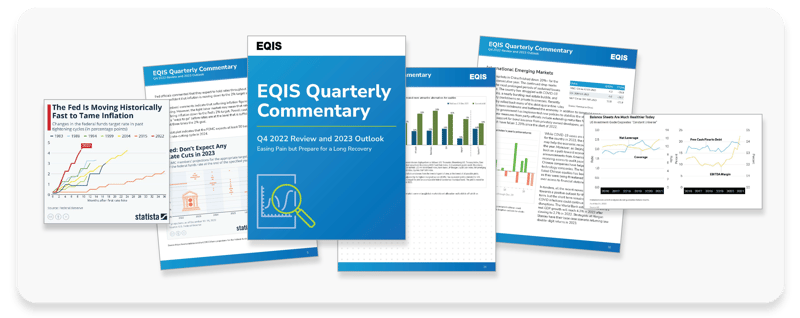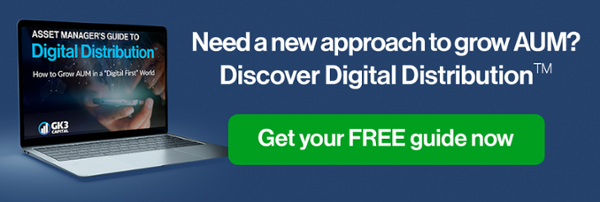“Distribution is currently undergoing a rapid transformation to digital,” according to a recent study by the Boston Consulting Group on the asset management industry, “The $100 Trillion Dollar Machine.”
Forward-looking asset managers understand the critical importance of creating websites that educate investors and inspire them to return again and again. An effective investment website builds trust and builds enduring relationships that can drive your sales and client service effort.

Every successful asset manager website educates visitors on the “5 P's.” In this article, we will highlight topic #4 of the “5 P's”: Performance.

An Overview of Topic #4: Performance
Any discussion of investment performance is a paradox. On the one hand, “past performance is no guarantee of future results.” On the other hand, investment selection begins and ends with performance. Asset managers must provide a clear explanation of performance (and risk) in order to build a relationship with investors.
Answering Questions About Performance
Investors start with broad questions about performance:
- How has a strategy, manager, or fund performed in the past?
- What are the drivers of returns?
- What are the potential sources of risk?
- What is the upside?
- How do unfavorable market conditions impact results?
- What are the market forces and management practices that shape the balance of risk and return?
Sponsors may need to start with a basic description of the return stream:
- How much of the returns can be attributed to appreciation or income?
- What is the taxable nature of the returns and the applicable tax rates?
The return discussion will vary across asset classes and strategy types. A discussion of the performance of a stock mutual fund will differ from a private equity fund. Performance considerations will also vary across income investments. The performance characteristics of a municipal bond portfolio is very different from a private credit portfolio.
Two Types of Performance Content
Broadly, asset managers can provide two types of performance-related content on their websites:
- 1. Data
- 2. Education
Actual performance data requires a compliance focus. The numbers and accompanying disclosures are subject to strict regulatory guidelines. Education on broad, performance-related themes allows for greater flexibility in creating content.
Individual Versus Institutional Investors
The return discussion will also need to vary for individual versus institutional investors.
Private, taxable investors may focus on after-tax returns and tax mitigation strategies.
Institutional investors and their advisors may expect an in-depth statistical discussion, encompassing a variety of Modern Portfolio Theory statistics and other quantitative analyses:
- Alpha, beta, and standard deviation
- Sharpe ratio or other metrics of risk and return
- Correlations
- Active share
The institutional investor (and their gatekeepers) seek managers who can consistently produce excess returns, especially if they are uncorrelated with other allocations. Thus, institutions may expect the manager to provide even more granular performance statistics, for both fixed and rolling periods. Some may seek scenario analysis and stress testing.
Investors of all types also appreciate information on performance attribution. For some, a basic list of top contributors and detractors in an equity portfolio may suffice. Others may seek a more detailed analysis of the risk contribution by position or may compare manager results versus a benchmark in terms of allocation, selection, and interaction effects.
The performance discussion begins before an investor commits to a strategy and continues throughout the holding period. A manager should provide insight along with the statistics, and help investors understand not just the strategy but also broader economic and market forces. Communication can enhance the asset-gathering and retention process.
Communicating About Performance
There is an extensive menu of performance reporting opportunities on every asset manager’s website bearing in mind, of course, compliance is paramount across the entire performance reporting process. Reporting opportunities may include:
- Fact sheets
- Performance tables and “widgets”
- Monthly and/or quarterly performance reports
- Monthly or quarterly manager webinars
- Enhanced advisor-only or institutional reports and portals (password protected)
- Attribution studies
A Growing TAMP Shows How
A growing TAMP (and GK3 client) illustrates the palate of quarterly reporting opportunities. The reporting is available through the firm’s website and via download.

Managers who provide solid performance as well as comprehensive reporting benefit from enhanced client relations, improved inflows, client retention, and potential referrals.
Next Steps
Read the final blog in this 5-part series on the key topics for asset manager websites that help drive inflows - Topic #5: Product.
To reach the next level in web-based sales and marketing for asset managers, watch our video series or download our eBook on Digital Distribution.

John Gulino
John Gulino is the Founder and CEO of GK3 Capital LLC. Experienced in all facets of distribution including management, direct sales, training, and development, John has been fortunate to represent some of the industry’s most respected and innovative financial institutions and has consulted with many more of the top asset management firms in the industry on how to better align their sales and marketing efforts.






